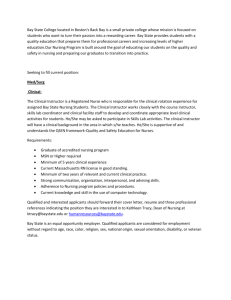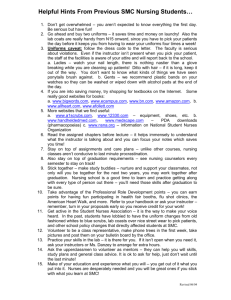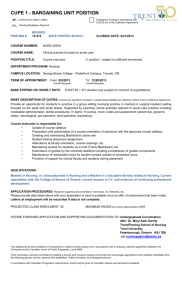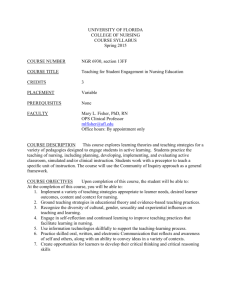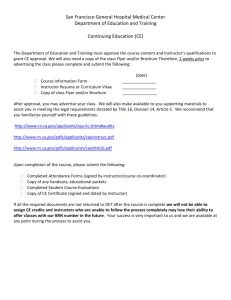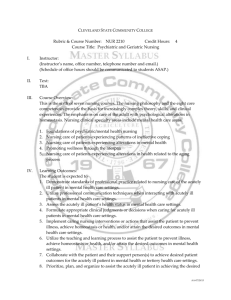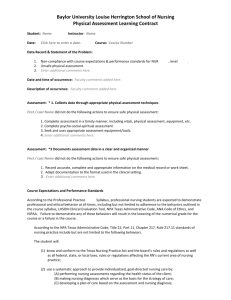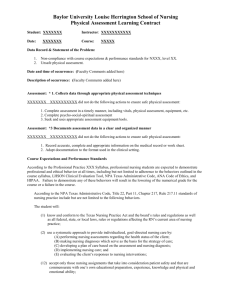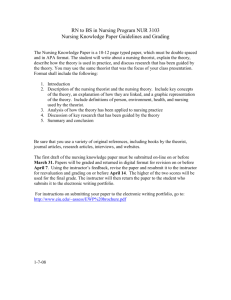Clinical Conference Power Point
advertisement
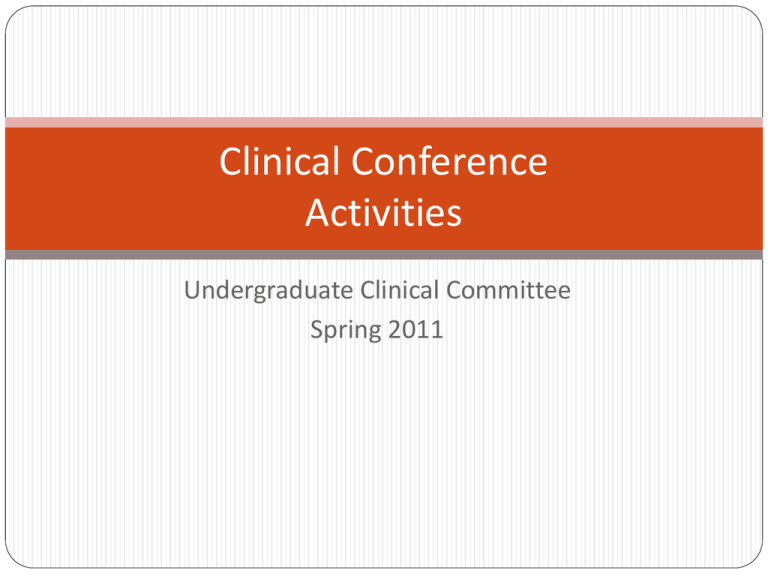
Clinical Conference Activities Undergraduate Clinical Committee Spring 2011 Definition “Clinical Conferences are group learning experiences that are in integral part of the clinical experience.” “Provide meaningful learning experiences and opportunities for student to bridge the gap between theory and practice” “Students can develop critical thinking and clinical decsionmaking skills as well as confidence in their abilities to express themselves with clarity and logic.” Billings D.M., & Halstead, J.A., 1998 “Teaching in the Clinical Setting” by Lillian Stokes, Phd, RN in “Teaching in Nursing A Guide for Faculty, pp 289 to 295 W.B. Sanders, Philadelphia PA. Benefits of Conference Organize/Analysis the days events Review concerns Pull information from Theory into Clinical Evaluate where the students are Clarify expectations for the clinical day Socialize /develop rapport between students to student, and faculty to student Preclinical Conference Student: o Share information about upcoming events o Ask questions o Express concerns o Seek clarification Faculty o Clarify student misconception o Identify problem areas o Learn about student thinking o Identify readiness to implement care Postclinical Conference Discuss clinical experience Debrief Analyze clinical situations Clarify relationship Identify problems Ventilate feeling Develop support systems Developing cognitive skills Focus on problem solving, decision making and critical thinking May use a specific case study as example or general examples Consider assigning different aspects of one client’s care (particularly if it is applicable to current classroom content) to small groups who then report and collaboratively develop a plan of care Consider list of critical thinking situations and emphasize that there is no ONE right answer. Students work in pairs to consider nursing approaches. Emphasize the process of critical thinking, not the outcome. Debriefing clinical experiences Allows student opportunity to report on clinical learning, describe and analyze the care they provided Allows student to share feelings and perceptions about the experience. Students will receive feedback from peers and instructor. Students learn vicariously from these reports If a critical incident such as a code or client death, typically the student(s) involved will present the situation and the group analyzes it Consider an “issue” conference such as do not resuscitate or atmosphere on the unit. Students discuss and critical thinking can be applied. Clinical Teacher Plans discussion- should consider the curriculum and the learner( student) Prepares students for post conference by offering a brief overview of what may be accomplished during the conference. Sometimes, conferences take on a life of their own and go off in a direction unplanned by instructor. It happens! Presents problem, issue, case for analysis Develops questions for discussion-use higher level-to assist student in applying knowledge to clinical situations Facilitates discussion and encourages students to participate, by posing ideas and question, providing cues, and lead statements Develops and maintains atmosphere for open discuss of ideas and issues Keeps time and avoid side-tracking, keep discussion focused and moving in a meaningful way Provides feedback in a nonthreatening way Student Prepares for discussion Participates actively Works collaboratively with group members to arrive at solutions and decisions Examines and considers different points of view. General Rules At some point, students may be paired for discussion topics. Determine that all clinical tasks and documentation have been completed, if possible, before beginning post conference. Try to facilitate a time of discussion uninterrupted by staff or telephone calls Some instructors encourage students to bring lunch or dinner to the conference if time is an issue Assure that client confidentiality is effectively maintained Set an atmosphere in which listening, respect for others’ comments and ideas, and openness to new perspectives is valued. Practical Post Conference Activities Demonstrate a new piece of equipment or to have students practice a skill Consider an inservice being offered by the facility if it meets learning objectives. Discuss issues that concern students such as weekly written assignments and graded written assignments. Work together on problems such as IV calculations An instructor may give a quiz that students grade together. References Gaberson and Oermann, 2010, Clinical Teaching Strategies in Nursing, Billings D.M., Halstead, J.A., 200 Teaching in Nursing A Guide for Faculty, wb Sanders, Philadelphia PA.
